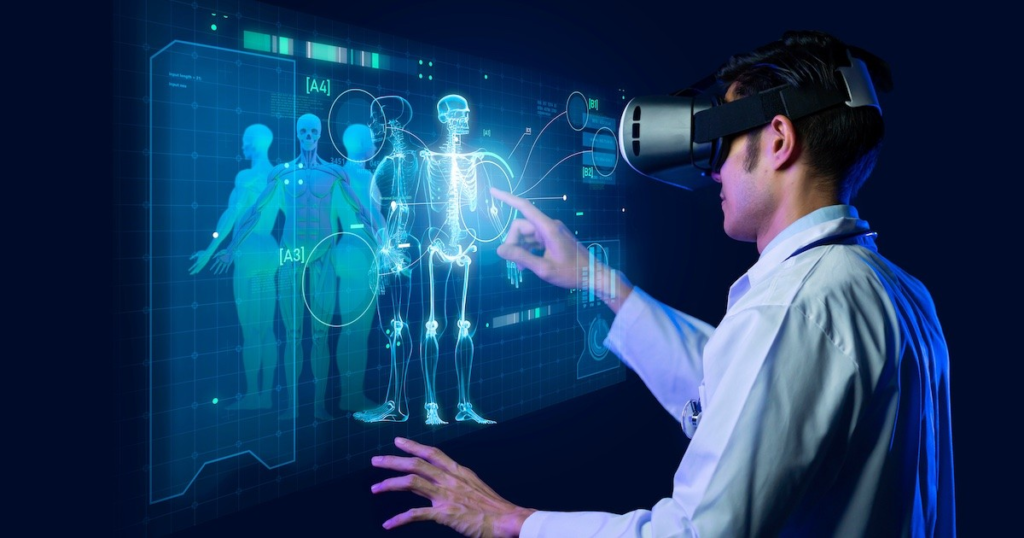Introduction
The integration of Artificial Intelligence (AI) in healthcare has brought about a revolutionary change, especially in disease detection. Among its most impactful applications are the early diagnosis of heart disease and cancer—two of the world’s leading causes of death. This article explores how AI enhances medical diagnostics, making disease detection faster, more accurate, and personalized.

What is AI in Healthcare?

AI in healthcare refers to using machine learning algorithms and data-driven models to mimic human cognitive functions, including learning and decision-making. These technologies help in detecting, diagnosing, and predicting diseases with greater precision.
How AI Detects Heart Disease
Heart disease remains a global health challenge, but AI-powered solutions are reshaping its detection and management.
1. Predictive Analytics
AI analyzes patient records, lifestyle data, and genetic information to predict the risk of developing heart disease. This allows preventive measures to be implemented early.
Example: Machine learning models like IBM Watson Health can evaluate millions of patient records to identify individuals at risk.
2. Imaging and Diagnostics
AI-powered tools like computer vision analyze heart scans (ECGs, MRIs, CT scans) to detect abnormalities.
Example: Algorithms can identify heart blockages, valve issues, and early signs of cardiac arrest with accuracy surpassing human specialists.
3. Personalized Treatment Plans
AI systems create customized treatment plans by analyzing patient-specific data, helping doctors choose the best therapeutic path.
Example: AI-based platforms recommend lifestyle changes and medications tailored to individual patients’ medical histories
4. Wearable Technology for Heart Monitoring
Smart devices like smartwatches use AI to continuously monitor heart activity, detecting irregularities such as atrial fibrillation.
Example: The Apple Watch has saved lives by alerting users to potential heart issues before symptoms appear.
**How AI Detects **Cancer
Cancer detection through AI has seen significant progress, helping save lives through early diagnosis and treatment.

1. Image Analysis in Oncology
AI-driven image recognition algorithms can analyze mammograms, MRIs, and CT scans to detect tumors with remarkable accuracy.
Example: Google’s DeepMind and IBM’s Watson are leading in AI-powered cancer diagnostics.
2. Genetic Analysis for Cancer Markers
AI can detect cancer-causing genetic mutations through genome sequencing, enabling early diagnosis and targeted treatments.
Example: Companies like Foundation Medicine use AI in cancer genomics to personalize treatments.
3. Liquid Biopsy and Biomarkers
AI-powered systems can detect cancer through blood tests, analyzing biomarkers that indicate the presence of cancer cells.
Example: Grail’s Galleri test leverages AI to detect over 50 types of cancer from a single blood sample.
4. Cancer Prediction Models
AI can predict cancer recurrence based on historical patient data, aiding in long-term care planning.
Example: AI tools like Oncotype DX predict breast cancer recurrence, guiding chemotherapy decisions.
5. Drug Discovery and Treatment Optimization
AI accelerates drug development by identifying potential treatments faster and optimizing therapy protocols.
Example: AI-powered drug discovery platforms helped accelerate COVID-19 vaccine development and are being applied to cancer treatment.
AI Applications in Clinical Practice

1. Early Detection through Screening Programs
Hospitals use AI to screen large populations efficiently, detecting potential diseases before symptoms appear.
2. Telemedicine and Remote Monitoring
AI-powered platforms support telemedicine by diagnosing conditions remotely and enabling virtual consultations.
3. Decision Support for Doctors
AI offers real-time support to doctors by suggesting treatment plans, interpreting lab results, and alerting them to potential risks.
4. Advanced AI-Powered Robotics
Robotic-assisted surgeries use AI for enhanced precision, reducing surgical risks and recovery times.
Real-World Success Stories
- Mayo Clinic: AI-driven heart disease diagnostics reduced diagnostic time by 60%.
- Memorial Sloan Kettering Cancer Center: Their AI-powered system improved cancer diagnosis accuracy by 15%.
- Stanford University: AI identified skin cancer with the same accuracy as experienced dermatologists.
- Johns Hopkins: AI systems predict sepsis risk hours before symptoms manifest, saving countless lives.
Challenges and Ethical Considerations
While AI offers immense potential, challenges remain:
- Data Privacy: Patient data security is critical.
- Bias in Algorithms: AI models must be free from biases in medical data.
- Regulatory Approvals: Ensuring AI tools meet healthcare standards is essential.
- Integration in Clinical Practice: Training healthcare professionals to use AI tools effectively.
- Accessibility: Ensuring AI-powered diagnostics reach low-resource regions.
The Future of AI in Disease Detection

As AI evolves, future innovations may include:
- Real-time Health Monitoring: Wearables offering real-time disease monitoring.
- Global Access: AI-powered diagnostics reaching remote areas.
- Advanced Genomic Research: Enhanced cancer detection using full genome analysis.
- AI-Driven Robotics: Assisting in complex surgeries with precision.
- Personalized Virtual Health Assistants: AI-powered assistants guiding daily health decisions.
Conclusion
AI’s role in detecting heart disease and cancer is transforming healthcare by enabling early detection, accurate diagnosis, and personalized treatments. As technology advances, AI-powered diagnostics will continue to save lives and redefine medical care globally.
Call to Action: Stay updated on the latest in AI-driven healthcare by subscribing to our blog
